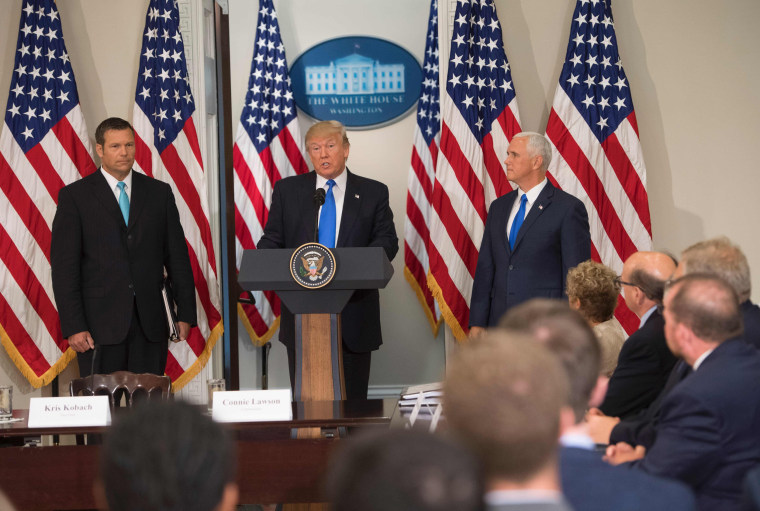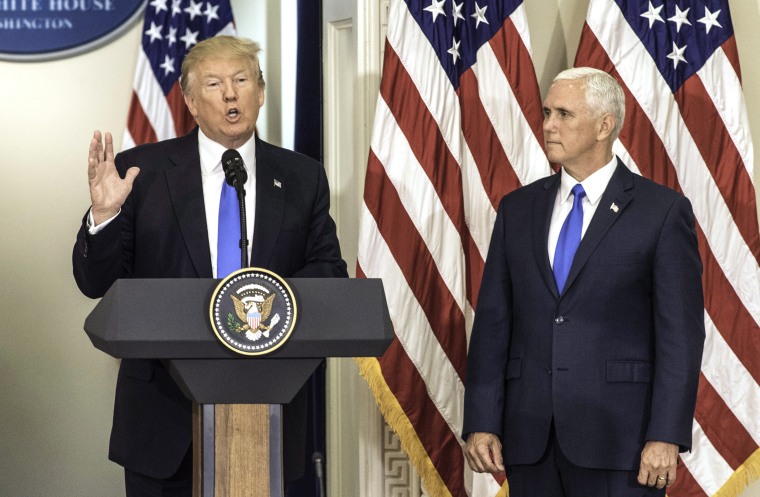WASHINGTON — President Donald Trump spoke Wednesday at the first public hearing of his vote fraud commission and raised the possibility that substantial voter fraud had occurred in the 2016 election, but he did not repeat past claims that millions of illegal ballots were cast.
"This issue is very important to me because throughout the campaign, and even after, people would come up to me and express their concerns about voter inconsistencies and irregularities, which they saw," Trump said. "In some cases, having to do with very large numbers of people in certain states.”
But Trump did not repeat his past claims, made without any evidence, that "millions" of people had voted in the election illegally, costing him the popular vote against Hillary Clinton, who topped him by about 3 million votes nationwide.
The president also questioned why certain states were refusing to cooperate fully with the commission's requests for voter information, hinting that those states might be hiding something.
"If any state does not want to share the information, one has to wonder what they’re worried about," Trump said. "What are they worried about? There’s something, there always is."
However, Vice President Mike Pence, the commission chair, said the panel had "no preconceived notions" or "pre-ordained results."
"We're fact-finders," said Pence, who made no mention of voter fraud during his brief remarks.

During the introductions, several members of the commission suggested ways in which the panel could potentially root out voter fraud.
Hans von Spakovsky, a senior legal fellow at the Heritage Foundation and a former member of the Federal Election Commission, insisted during his open remarks that voter fraud was a nationwide issue and claimed that his organization found thousands of cases across the country.
“We do have problems that need to be fixed,” he said in his opening remarks. “We have a history of voter fraud in this country.”
His comments were also echoed by commission member Ken Blackwell, the former Ohio secretary of state.
Others said there were little or no instances of voter fraud and focused on other matters, such as aging voting equipment and getting more residents registered to vote.
Alan King, an Alabama probate judge, said in his opening remarks that in the 16 years he's served as the chief election official in Jefferson County, "I have not seen evidence of voter fraud" — only one instance where a son and his father had the same name.
"It’s not complicated to obtain the information, but everything is with the caveat to make sure it’s not a false positive," King said.
Trump repeatedly made unsubstantiated claims about rampant voter fraud during the presidential election last year and has insisted that the system was "rigged" against him.
Just days after assuming office, Trump vowed a major investigation into the millions of "illegal" votes he claimed were cast. At the time, White House Press Secretary Sean Spicer said the investigation wouldn't just be about the 2016 election, but "about the integrity of our voting system."
Experts have repeatedly said that voter fraud is extremely rare.
Trump formed the panel, officially named the Advisory Commission on Election Integrity, in May through executive order to study “vulnerabilities” in the election system.
The commission has faced increasing criticism after co-chair Kris Kobach sent a letter last month to all 50 states and Washington, D.C., asking officials to turn over large amounts of voter data, some of which officials considered to be sensitive and confidential. Some state officials and privacy experts also expressed concern about that information being made public.
Kobach’s request was met with swift backlash from officials in both parties and prompted a flurry of lawsuits.
It also inspired thousands of voters to remove themselves from voter rolls, fearing their personal information would be compromised, despite 48 states not fully complying with the commission’s request.
Kobach told reporters after the meeting that he believed the people who unregistered may have been "illegal" and were afraid and removed themselves to not be outed.
He also claimed that the commission has a "substantial" staff to create a methodology for the data collection. Data experts have raised serious concerns about how any meaningful database could be created given the mishmash of data from the states that will hand over public information.
Dartunorro Clark and Ali Vitali reported from Washington, and Adam Edelman from New York.


